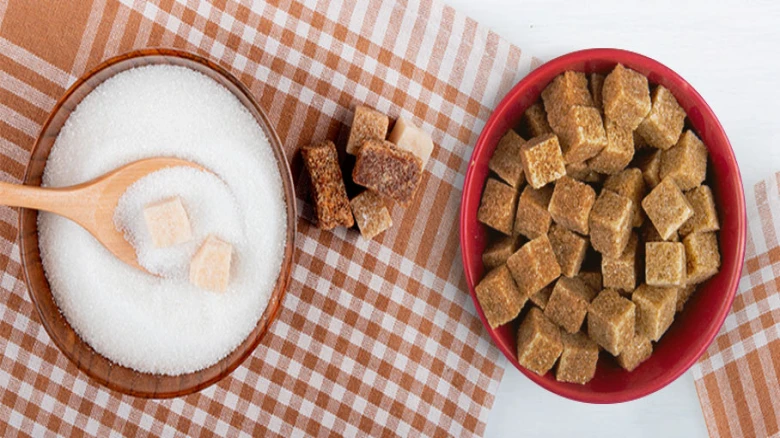Jaggery isn't made that way, she said, and it's actually quite beneficial for people who are anaemic because it's high in iron, magnesium, potassium, zinc, calcium, and selenium.
Digital Desk: Many health-conscious people have switched from sugar to jaggery or other sugar substitutes because of the numerous widely held misconceptions about the negative consequences of sugar consumption. But does one really offer better health than the other? It turns out that both have advantages and disadvantages; which one is better to consume more frequently? A celebrity dietician named Rujuta Diwekar presented some statistics comparing jaggery and sugar. Have a look at what she said:
1) Jaggery cannot be used in place of sugar.
2) The use of sugar and jaggery depends on the time of year and the food pairings.
3) It is advised to use sugar in the summer and jaggery in the winter.
4) Add jaggery to dishes like bajra roti, gond laddoo, til chikki, and gud poli.
5) Add sugar to sherbet, coffee, tea, shrikhand, karanji, and other beverages.
6) At home, use sugar and jaggery in tried-and-true ways.
The source of both sugar and jaggery, according to dietician Garima Goyal, is sugarcane juice; the processing is just different. She continued, "But the advantages of jaggery surpass those of sugar," noting that jaggery is an entirely natural product while sugar contains chemicals as a result of the bleaching process it goes through. The production of refined sugar involves the use of chemicals. Jaggery isn't made that way, she said, and it's actually quite beneficial for people who are anaemic because it's high in iron, magnesium, potassium, zinc, calcium, and selenium.
Jaggery's gradual absorption stabilises blood sugar levels, she continued, whereas sugar's quick absorption raises blood sugar levels. Jaggery is a complex sugar with lengthy sucrose chains, which explains why.
"Jaggery provides minerals, vitamins, and antioxidants, making it a superior source for the body's health and immunity than sugar, which is just empty calories. Jaggery is said to have anti-allergic characteristics and aid in the treatment of a number of breathing conditions, including asthma, cough, colds, and chest congestion. After a meal, a piece of jaggery helps with digestion by removing extra toxins from the body, she said.
However, it should be remembered that both sugar and jaggery may cause the body to store more calories. Yet if forced to choose, Goyal advised choosing jaggery rather than refined sugar because, despite being high in calories, it also has some extra health advantages.
Shivani Bajwa, CEO and Founder of YogaSutra Holistic Living and a functional medicine coach and yoga therapist, added that sugar has a way of causing holes in the lining of your gut, leading to a condition known as leaky gut that is quite common among Indians. Sugar also inflames your liver. "Jaggery contains sugar, but it differs from refined sugar in that it also contains extra nutrients, such as magnesium, calcium, and iron. Yet, it must also be consumed wisely, she added.
Let's not forget that all of them have an impact on insulin, and too much of either can lead to insulin resistance, which is one of the main causes of persistent weight gain, hormonal imbalances, and autoimmune diseases like Hashimoto's thyroid.

Leave A Comment